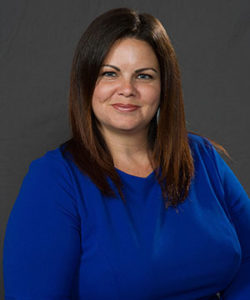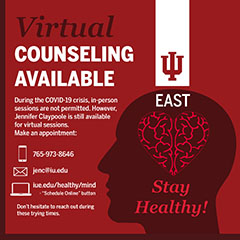Q&A: IU East’s director of Behavioral Health provides tips for mental health, Virtual Counseling for students during COVID-19
Jennifer Claypoole is the director of Behavioral Health for the Center for Health Promotion at Indiana University East. Claypoole is continuing to offer counseling for students through a new Virtual Counseling option.
Virtual Counseling has been set up for IU East students during coronavirus (COVID-19). As the university is following recommendations for social distancing and restrictions in place by the state of Indiana for essential travel and work, in-person sessions are not permitted. Permission was received for Claypoole to meet with students through virtual sessions.
Students can make an appointment with her by calling 765-973-8646 or email jenc@iu.edu. Scheduling online is also available at iue.edu/healthy/mind. Students will receive a link for a Zoom Health meeting, which can occur over the phone or video.
Claypoole has a Bachelor of Arts in Psychology from Purdue University and a Masters in Social Work from Indiana University. She is a licensed clinical social worker. She has 12 years experience working community mental health with children, families and adults, helping them with issues such as parenting skills, behavior management, family preservation, life skills, and mental illness management.
She previously worked with Richmond State Hospital as the director of Social Work, serving adults with severe mental illnesses. The focus was assisting them with managing their illness and transitioning back to a community setting.
Claypoole joined IU East in November 2018 and has been a resource for both staff and students related to life and stress management, anxiety, depression, eating disorders, and other mental health concerns.
Below are tips and information Claypoole has provided for improving mental health while maintaining social distancing recommendations.
Q: What should people be most aware of concerning their mental health during COVID-19?
A: The mind can work overtime during a crisis, and media portrayals only exacerbate the problem. The phrase “your anxiety is lying to you” is something to be mindful of, especially for someone that already struggles with general anxiety, worry, and intrusive thoughts. When reading or watching media about the virus, make sure you’re doing so only to educate yourself on risk factors, and choose only trusted news sources. Googling symptoms or reading stories about virus victims can only increase negative thoughts and induce panic, further exacerbating anxiety and worry.
Q: What may be some of the mental impacts of social distancing during COVID-19?
A: Time alone at first can be enjoyable and freeing, but the four walls can close in very quickly. Many people thrive on being around others in a work setting, classes, the gym, and other activities that are likely not occurring right now. Lack of social contact can quickly impact one’s mental health in ways such as increased anxiety, worry, sadness, despair, and just simple boredom. Use phone and online social networks to stay connected with others. They are likely feeling the same emotions as you, and just brief check-ins can alleviate some of that. It’s okay to talk about your health concerns, but it is detrimental to your (and other’s) mental health to solely focus on this virus. Talk about your plans and dreams when social distancing is no longer needed; share recipes and ideas for activities in the house; ask for suggestions on home improvement projects; watch a show or movie together via FaceTime or phone.
Q: How can individuals improve their mental health while at home? Are there different tips for someone who may live with roommates, family members or if they are isolated from others?
A: It is normal to feel concerned but take the necessary precautions and continue with a normal routine as much as possible. If working remotely, keep the same schedule as though you’re in the office. If you’re in college or school, keep the same study routine. Breaks are important, just as they are in office and classroom settings. Humans thrive on routine and structure, and these will help keep us focused on everyday issues instead of panicking that life is at a standstill. Self-care is of utmost importance, so check in with others, take short naps, hot baths or showers, use essential oils in diffusers or baths or on your pillow. Download apps such as Calm, HeadSpace or YouTube for brief deep-breathing exercises, meditation, and visualization. Use the plethora of free activities being offered online during this time, such as national park and museum tours, book downloads, exercises for both kids and adults such as the Kennedy Space Center, marine biology camps, Disney and many others. Work on long overdue home projects such as painting a room, simple repairs, organizing photo albums or scrapbooks.
People living with others likely want some space to deal with being cooped up with the same individuals day after day. Find your own space and practice self-care when needed, but take time with others as well. Avoid talking about the same issues repeatedly such as the coronavirus, money, or other stressful topics. Set aside specific times to address those issues. Play board games together, watch movies or series, take some online tours together, get outside and take walks or watch the rain. Social distancing is a great way to rediscover simple pleasures we so easily ignore in our everyday hustles to get to work, soccer practice, dance class, and board meetings. We’ve been given a long-overdue timeout, so use it wisely.
Q: How can we influence others around us regarding mental wellness right now?
A: Spreading kindness and positivity are of utmost importance right now. Social media and online forums are already at the forefront of communication, and even more so with social distancing in place. Check in with loved ones and friends, share links to activities and resources that others can use during down time such as museum and national park tours, wildlife and natural parks education, and free book downloads. Share funny stories instead of virus stories, compliment others instead of scaring others (and yourself). Even if you’re feeling worried and scared, helping others increase positive thoughts can have the same impact on you. The human world has seemed increasingly violent, hateful, discriminatory, and self-centered in recent years. Yet there has been an outpouring of generosity from organizations, groups and individuals related to employee stimulus plans, paying workers who are laid off such as arena staff, retail staff and restaurant servers, donating money to fund healthcare research and others in need, manufacturers producing masks or healthcare equipment instead of their usual output, and many local supports. If you insist on reading online stories, look up these uplifting events that are taking place daily. You can do your part by making masks for local healthcare workers, donating to local food banks, shelters or charities, or make a meal for your neighbors or elderly loved ones. Small acts make a big difference.
Q: Virtual Counseling is a very new approach. What could students expect when arranging an appointment?
A: They need to be sure to check their email, as they will receive a link for the Zoom appointment. I will also send them a counseling agreement that outlines counseling expectations, confidentiality and telehealth guidelines. Unless they choose not to use the video portion, we will engage face-to-face through video and interact as we would in an office setting. I do my best to ensure a quiet, private area for the conversation. Internet speeds and signals may be an unforeseen distraction depending on the student’s resources used during the session. There are no judgments or preconceived notions on my part. The students direct the session. In other words, this is about the student and their needs; I am here to offer support, guidance, and tools for coping with life stressors.



